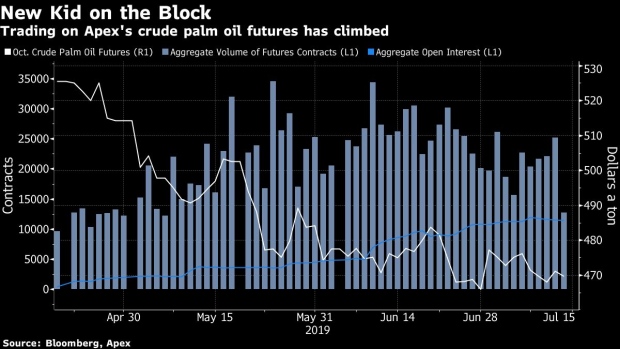Jul 16, 2019
Malaysia's Palm Oil Futures Dominance Challenged by Upstart
, Bloomberg News

(Bloomberg) -- Palm oil futures have been trading on Singapore’s Asia Pacific Exchange for just three months, but they’re already making their mark in a world long dominated by the benchmark contract in neighboring Malaysia.
The Chinese-backed bourse started trading crude palm oil futures on April 18. The product is dollar-denominated and physically deliverable to ports in West and East Malaysia, as well as Belawan and Dumai ports in Indonesia. The trading hours include a night session, and are longer than those on the Bursa Malaysia Derivatives and the Dalian Commodity Exchange.
Daily volume has held above 20,000 lots of 10 tons each on most days in the past two months with a high of 34,575 lots on May 24, while open interest has more than doubled to above 11,000 since the start of June. Still, the benchmark contract in Kuala Lumpur dwarfs Singapore, with daily volume there often above 40,000 and open interest about 270,000, with each lot equal to 25 tons.
Palm oil is the world’s most consumed vegetable oil, and is found in everything from ice cream to shampoo and biofuel. Producers, traders and consumers use the futures markets to hedge their price risk. Indonesia and Malaysia are the largest growers and together supply more than 80% of the world’s palm oil.
Indonesian Reference
As a new exchange, Apex performed better than most people expected in terms of creating liquidity for crude palm oil in dollars even though the start coincided with a sharp decline in prices, said Gnanasekar Thiagarajan, head of trading and hedging strategies at Kaleesuwari Intercontinental.
The contract provides a valuable reference to Indonesian free-on-board prices versus futures, said Marcello Cultrera, institutional sales manager at Phillip Futures Sdn. in Kuala Lumpur. “Given as well the extended overnight trading session compared to Bursa Malaysia, this allows for cross market trading opportunities versus CPO’s main edible oil alternative, soybean oil,” he said.
Crude palm oil for October delivery climbed for the second day on Tuesday, rising 0.3% to $479 a ton on the Asia Pacific Exchange. The contract for the same month in Kuala Lumpur slipped 0.2% to 1,985 ringgit ($483.20) a ton.
The benchmark futures in Kuala Lumpur will seek to maintain its position by introducing new products that strengthen the palm oil complex and provide greater integration with the securities market, including a contract on fully Certified Sustainable Palm Oil by early 2020, said Samuel Ho, acting chief executive officer of Bursa Malaysia Derivatives.
The exchange has an open position in crude palm oil futures that’s about seven times the daily volume, which signifies confidence among participants to hold long-term hedge positions, with positions currently through to May 2021, said Ho. The bourse will start options on palm olein futures in the fourth quarter.
(Updates to add Singapore and Kuala Lumpur prices in sixth paragraph.)
To contact the reporter on this story: Anuradha Raghu in Kuala Lumpur at araghu3@bloomberg.net
To contact the editors responsible for this story: Anna Kitanaka at akitanaka@bloomberg.net, James Poole
©2019 Bloomberg L.P.


